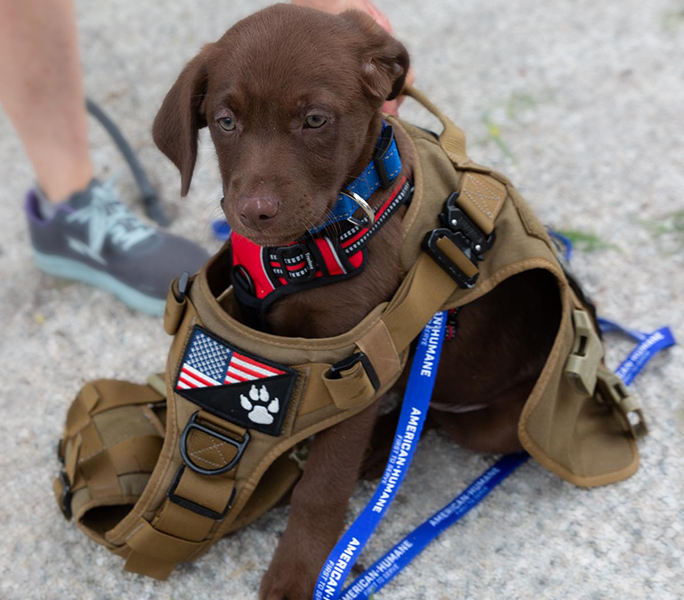Stars and Stripes | The best medicine for veterans with PTSD can be a wagging tail

By: Robin Ganzert
As we prepare to celebrate the Fourth of July, the invisible wounds of war affecting our returning military heroes should be top of mind. Post Traumatic Stress Disorder (PTSD) — which can manifest as anxiety, depression or nightmares, among other symptoms — is a battle that veterans face long after they have left the theater of war.
According to the Department of Veterans Affairs, up to 29% of military members who served during Operation Iraqi Freedom and Enduring Freedom will struggle with the condition.
Fortunately, service dogs have emerged as a beacon of hope for veterans battling PTSD. These remarkable animals provide a unique form of companionship and support, offering a bridge to healing that traditional medicines often cannot achieve alone. The bond between a veteran and their service dog goes beyond the surface; it is built on trust, unconditional love, and a profound understanding of the companion’s invisible scars.
The impact of service dogs on veterans’ lives cannot be understated. Countless veterans have found solace, purpose and renewed hope through their bond with a service dog.
Consider Raul, a 20-year U.S. Navy veteran who suffers from PTSD. Raul now lives in California with his service dog Sunny, who has greatly improved Raul’s quality of life.
“The training of my companion Sunny has given me the tools to better understand what triggers my PTSD by redirecting my attention to Sunny,” said Raul. “I now look forward to my daily activities and the time I spend with my loyal companion. He has taught me one life lesson in particular — patience and control of my emotions, especially in a public setting.”
One of the most significant contributions of service dogs to PTSD treatment is their ability to mitigate anxiety and panic attacks. These loyal companions are trained to recognize the early signs of distress and intervene, providing a sense of security and grounding in stressful situations. They can detect changes in heart rate, body temperature, and even cortisol levels, providing invaluable support to their handlers. With their calming presence, service dogs offer a lifeline to veterans, enabling them to regain control over their emotions and navigate daily life with newfound confidence.
Service dogs also play a crucial role in facilitating social reintegration for veterans with PTSD. Those struggling with the condition often feel isolated and struggle to form connections with others. Service dogs act as a bridge, breaking down barriers and enabling veterans to engage with their communities. These pups serve as icebreakers, fostering a sense of belonging for their handlers. They accompany veterans in public spaces, providing a buffer between their owner and the external world — helping to ease anxiety.
The benefit service dogs provide to veterans suffering from PTSD is undeniable. But unfortunately, the demand for these miracle animals far outweighs the supply, and the cost can be prohibitive. Training the animals can take more than a year and cost tens of thousands of dollars.
That is why my organization, American Humane, operates a program called Pups4Patriots. The initiative finds dogs in search of forever homes and trains them to be lifesaving service dogs for veterans, free of charge.
But we cannot do it alone. In addition to the amazing work done by organizations like American Humane, policymakers and government officials must do their part as well. More money is needed from Congress to fund these lifesaving programs. And for government agencies like the VA, leaders should reallocate existing funding to better prioritize the healing power of a wagging tail.
As we celebrate the Fourth of July, let us take tangible steps to support our veterans. We must invest in comprehensive programs that prioritize the mental health of those who have selflessly served our nation. This includes expanding access to service dogs, improving mental health services, and removing stigmas associated with seeking help.
Our veterans deserve our utmost gratitude, respect and unwavering support. Let us honor their sacrifices by acknowledging the struggles associated with PTSD and recognize the vital role that service dogs can play in their journey to recovery. Together, we can ensure that no veteran walks alone, and that their path toward healing is paved with compassion, understanding, and the unwavering love of a furry best friend.
Robin Ganzert is president and CEO of American Humane, the country’s first national humane organization. The organization manages the program Pups4Patriots.